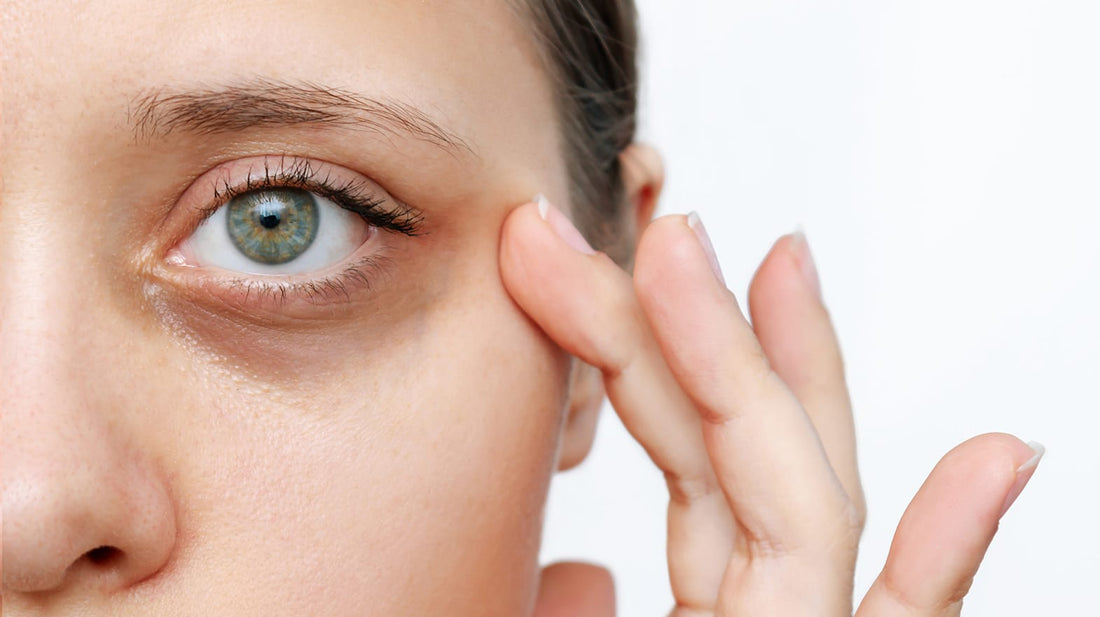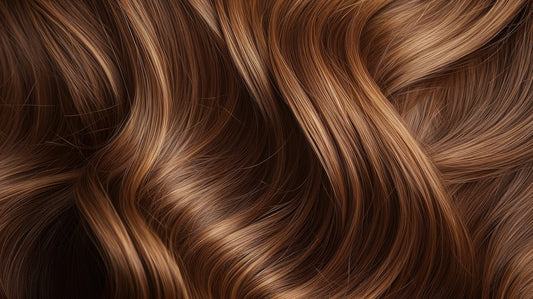Say Goodbye to Dark Circles Under Your Eyes

It’s hard to look in the mirror and see dark circles under your eyes looking back at you. Don’t worry, we've all been there.
Dark circles and under-eye bags show up for a variety of reasons. Whether it be a late-night Netflix binge, an early sign of aging, or just plain old genetics, under-eye bags can be a real downer. They can leave your skin looking tired and saggy.
No matter the cause, it's time to wave goodbye to tired eyes! Discover simple lifestyle tweaks and effective skincare products to get rid of your dark circles. Wake up to brighter, rejuvenated-looking skin.
Understanding the causes of dark circles
Dark circles can show up in a variety of shades, everything from dark purple to brown and even black. No matter your age, skin type, or tone, dark circles can be an issue.
The natural aging process is usually the main culprit when it comes to dark circles. As we get older, our skin gets thinner, and blood vessels beneath the surface become more visible. They can create a tired, sad, or older-looking complexion.
But dark circles are not just for tired 40-year-olds. A lot of other factors can contribute to its development. This makes treating them a somewhat complex issue. Understanding their causes is the first step in improving their appearance.
Dark Circles Causes
- Not Enough Sleep: When you don't get enough sleep, your eyes can look tired, and the blood vessels can fill up and show as dark circles.
- Natural Aging: Your skin grows thinner as you get older, making blood vessels around the eyes easier to see.
- Dehydration: Not drinking enough water can make the skin appear more sunken and blood vessels more visible.
- Lifestyle: Too much junk food, alcohol, and stress can cause dark circles to show up.
- Genetics: If your parents or grandparents have dark circles under their eyes, then you may get them as well.
- Losing Fullness under-eyes: As you get older, you lose some fat, collagen, and elastin that keep your face looking full. As a result, less fullness under the eyes can cause dark circles.
- Inflammation: Frequent rubbing of the eye or allergies can cause inflammation and damage to blood vessels.
- Medical and skin conditions:
- Eczema
- Contact Dermatitis
- Hyperpigmentation
- Anemia
- Vitamin deficiencies
- Hypothyroidism
- Gastrointestinal issues
To really address dark circles under your eyes, you need to know the causes. If they're mainly genetic, you might need to think about long-term solutions. If your dark circles are from your lifestyle, like not getting enough sleep, then making some small changes in your daily habits can make a big difference.
The impact of lifestyle factors on dark circles and under-eye bags
Lack of sleep is a common contributor to the appearance of under-eye bags. When you don't get enough quality sleep, the blood vessels under your eyes can become dilated. This makes the skin under your eyes look darker and puffier.
Too much stress can also contribute to bags under your eyes. Chronic stress can cause fluid retention and inflammation in the body. Consequently, the increase in inflammation will make the area under your eyes look swollen and baggy.
Your diet and hydration levels can impact the appearance of dark circles under the eyes. For example, consuming too much sodium can lead to water retention and swollen-looking skin. But a nutrient-rich diet high in antioxidants can help reduce inflammation and promote healthy skin.
Skincare products and ingredients to target under-eye bags
There are tons of skincare products on the market that claim to reduce dark circles under the eyes. Above all, look for quality products from trusted brands that are formulated with effective ingredients.
A key ingredient to look out for is caffeine. It's great for tackling dark circles, thanks to its ability to tighten up blood vessels under the skin. As a result, caffeine works wonders at minimizing puffiness and swelling, making under-eye bags a lot less obvious. Plus, there are other superhero ingredients like retinol, hyaluronic acid, and vitamin C that also do a fantastic job at fading dark circles.
Another thing to remember is that the skin under your eyes is very delicate, so choose products with gentle ingredients. Look for products made specifically for under-eye care. They're usually lighter and better able to soak into your skin. Avoid products with harsh chemicals or fragrances that can cause irritation and actually make dark circles appear worse.
Restorsea PRO Firming Eye Serum
Tips for preventing and managing under-eye bags
Prevention is the key to keeping under-eye bags at bay. A great tip is to make an extra effort to shield your skin from sun damage. Those sneaky UV rays can speed up aging and make under-eye bags worse. Wear lots of sunscreen and pop on a pair of sunglasses whenever you're outside, even when it's cloudy.
Another important tip is to avoid rubbing or tugging at the skin under your eyes. It's super delicate and easily damaged. Whenever you're applying skincare products or makeup, be sure to gently pat them on to reduce friction.
Lastly, if you have, then you want to make an effort to get them under control. Allergies can lead to inflammation and the retention of fluid. This can show up as puffy, dark circles under your eyes. Consult with an allergist to figure out what triggers your allergies and come up with a plan to tackle them.
Frequently Asked Questions about Dark Circles
1. Can dark circles be permanent?
Dark circles can either be permanent or temporary, depending on the cause. Dark circles caused by genetics or thinning skin can be more difficult to treat. On the other hand, if they are caused by poor lifestyle habits, it’s actually good news. This means they are easily treatable with healthy choices and using good skin care products to improve their appearance.
2. Can dark circles be a sign of an underlying health condition?
Sometimes, dark circles can be a sign of an underlying health problem. For example, having an iron deficiency (anemia) or thyroid issues can sometimes be a factor. If your dark circles are a concern for you, it's a smart move to check in with a healthcare professional to get a proper diagnosis.
3. Can makeup hide dark circles?
Makeup can cover up dark circles. Using special makeup like color correctors and concealers can cover up dark circles and make them less noticeable. But to really fix them, you have to address the underlying causes.
Professional treatments for under-eye bags
Skincare products can do a great job of fading dark circles under the eyes. But if you've tried at-home remedies and you’re not getting results, it might be time to see a professional. Consult with a qualified dermatologist or plastic surgeon. They can offer treatments like dermal fillers, laser therapy, and chemical peels to help minimize dark circles and under-eye bags.
iS Clinical Youth Eye Complex
When to see a professional
Signs that it’s time to see a dermatologist include the following:
- Persistent Dark Circles: Have you tried everything to get rid of those under-eye shadows? More sleep, better food, top-notch skincare—but nothing works? It might be time to check in with a specialist. If those dark circles don't go away, it could mean there's more going on than simple lifestyle factors.
- Worsening Discoloration or Swelling: If your under-eye skin is getting darker or you're seeing swelling that wasn't there before, it might not just be a lack of sleep or stress. It could be a sign of other health issues, like allergies or a dermatological condition. Speak with a doctor to find a solution that will work for you.
In conclusion, dark circles are a part of life, but they are not impossible to fix. Once you know the cause, you can make choices to improve their appearance. Eating right and getting plenty of sleep can do wonders for your skin. And there are lots of products that can help soothe the skin and reduce its appearance. And lastly, if you're not seeing the results you want on your own, don't hesitate to speak with a professional for some advice.





